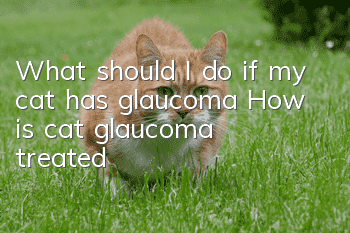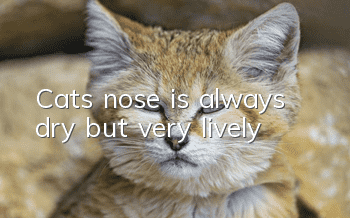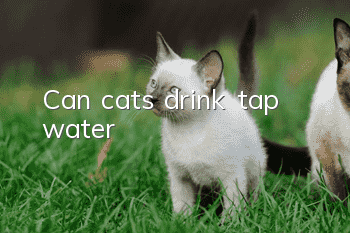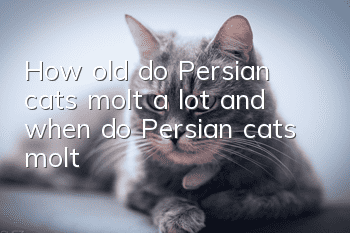What should I do if my cat has glaucoma? How is cat glaucoma treated?

Glaucoma is an eye disease that affects cats and people. It causes increased pressure inside the eye, causing eye swelling and pain, and may lead to blindness.
What is feline glaucoma?
Glaucoma is a term used to describe a group of eye diseases characterized by increased intraocular pressure. This is a progressive condition, meaning it usually gets worse over time. The eyes contain a fluid called aqueous humor. This fluid is produced in the ciliary body of the eye and drains through the structures of the iridocorneal angle. If the aqueous humor does not drain properly, the fluid will flow back and pressure will build up in the eye. A sustained increase in intraocular pressure can lead to serious damage to the eye.
Signs of glaucoma in cats:
Hazy eyes
Squinting to see things
Dilated pupils
The eyes become bigger
Catching eyes
Behavioral changes due to vision loss
Drowsiness or loss of appetite due to pain
Clumsy behavior due to reduced vision
Blindness
Causes of cat glaucoma
Glaucoma is divided into primary and secondary forms. Secondary glaucoma is the most common form of glaucoma in cats, and primary glaucoma is rare in cats.
Primary glaucoma: Primary glaucoma is a hereditary disease. Although rare, cats may be born with anatomic abnormalities that affect the drainage of aqueous humor from one or both eyes. Burmese and Siamese cats appear to have a genetic susceptibility to this disease.
Secondary glaucoma: Secondary glaucoma is the result of another condition, usually in only one eye.
Common causes of secondary glaucoma include:
Uveitis (inflammation of the eye)
Anterior lens dislocation
Eye trauma
Eye bleeding
Advanced Cataract
Tumors growing in the eyes
Diagnosis of feline glaucoma
If you notice abnormalities in your cat's eyes or other signs of illness, it's important to take her to the vet. Eye problems can get worse quickly, so you shouldn't wait to see if they get better. The eye disease can have several symptoms, so specific eye tests are needed to diagnose glaucoma in cats.
The veterinarian will begin by discussing your cat's eye history and performing a physical examination. When examining your eyes, your veterinarian may use a special lens toExamine the structure of the eye to look for evidence of glaucoma. If glaucoma is suspected, your veterinarian will check the intraocular pressure. This is done through a process called tonometry. A tonometer usually looks like a pen-like contraption. It is placed on the surface of the eye and measures the pressure inside the eye. If the intraocular pressure continues to rise and other symptoms of glaucoma occur, your veterinarian may diagnose your cat with glaucoma.
In some cases, your veterinarian may refer you to a veterinary ophthalmologist. These eye specialists have advanced knowledge and specialized equipment that allow them to quickly diagnose glaucoma in cats and recommend the most effective treatments.
Cure cat glaucoma?
The damage caused by glaucoma to the eyes is irreversible, so early detection is the best way to protect vision and prevent severe pain. Initial treatment for glaucoma usually involves the use of eye drops to reduce intraocular pressure and inflammation. Medications such as dorzolamide and timolol can reduce eye pressure. Steroids can be used to reduce inflammation. Glaucoma is difficult to control, so visit your veterinarian regularly. Your veterinarian will monitor the eye for changes and adjust medications as needed.
Surgical treatment may be recommended for cats with severe glaucoma and poor response to medical treatment. Surgical treatment involves the use of laser to correct the drainage of aqueous humor. In cases of blindness or serious illness, your veterinarian may recommend complete removal of the eye.
How to prevent glaucoma in cats?
There is no absolute way to prevent glaucoma from occurring in cats. Because primary glaucoma is hereditary, it is important not to breed cats with primary glaucoma. Secondary glaucoma can be prevented if the eye condition is detected before glaucoma is diagnosed. This is why routine veterinary exams are so important. Your veterinarian may be able to detect eye changes before glaucoma begins or in its early stages.
- What kind of cat is an orange cat? How much does one cost?
- How should I educate my cat when he poops on the bed?
- What is the personality of the Chinese civet cat?
- What does the Cheshire Cat's smile mean?
- Pregnancy care tips for British longhair cats
- What does it mean when a cat lies belly up?
- Does a Ragdoll cat's personality change when it's in heat?
- Why do cats get calicivirus and the best treatment plan for feline calicivirus!
- What are the symptoms of a kitten having a bad heart?
- My cat's nose is wet, could it be a "cold"?



